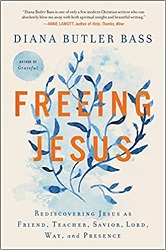Rediscovering Jesus as Friend, Teacher, Savior, Lord, Way, and Presence
by Diana Butler Bass
HarperOne, 2021. 285 pages.
Review written July 25, 2022, from my own copy, purchased via amazon.com
Starred Review
In Freeing Jesus, Diana Butler Bass tells us her life story — and how her life experiences affected the way she looked at Jesus.
She goes through six names for Jesus, which fit how she saw him during six stages of her life. I thought it was interesting that they were the same six names — even “Way” and “Presence” — my pastors used in a sermon series on names of Jesus.
Her journey had many similarities to mine, about a decade before me. I know the Christian college she refers to, because I went to a nearby Christian university that was a sports rival with it.
But it also got me thinking about the ways my views of Jesus have changed — and many of those ways were similar to the journey she describes. I like reading about her wrestling with the theology she was taught, because I’ve wrestled with some of the same ideas. Here’s a passage I marked because I love the way she expresses these transcendent ideas:
Jesus was born a savior, and he saved during his lifetime. “Fear not!” “Peace on earth!” He did not wait around for thirty-three years and suddenly become a savior in an act of ruthless, bloody execution. Indeed, the death was senseless, stupid, shameful, evil. It meant little other than silence without the next act — resurrection — God’s final word that even the most brutal of empires cannot destroy salvus. This is no quid pro quo. Rather, Easter proclaims that God overcomes all oppression and injustice, even the murder of an innocent one. At-one-ment means just that. Through Jesus, all will be renewed, made whole, brought back into oneness, reunited with God. Salvation is not a transaction to get to heaven after death; rather, it is an experience of love and beauty and of paradise here and now. No single metaphor, not even one of Paul’s, can truly describe this. We need a prism of stories to begin to understand the cross and a lifetime to experience it.
I love this concept she spells out at the end of her book:
We know Jesus through our experience. There is no other way to become acquainted with one who lived so long ago and who lives in ways we can barely understand through church, scripture, and good works and in the faces of our neighbors. In these pages, I have shared six Jesuses whom I experienced through something I call “memoir theology” (not theological memoir). Memoir theology is the making of theology — understanding the nature of God — through the text of our own lives and taking seriously how we have encountered Jesus.
This spoke to me because I’m working on a book about Psalms that uses my own experiences to illuminate the different types of Psalms. But she demonstrates with this book how much richness is added to her insights by looking at them through the lens of experience.
And after she said that, she points out that even though many church “fathers” wrote theology in the context of memoir, it was taken seriously because only certain (mostly male) perspectives were taken seriously. But she points out that all our experiences matter:
There is an old Berber proverb: “The true believer begins with herself.” Your experience of Jesus matters. It matters in conversation with the “big names,” when you argue with the tradition, and when you read the words and texts for yourself. It matters when you hear Jesus speaking, feel Jesus prompting, and sink into despair when Jesus seems absent. It all matters. The Jesuses you have known and the Jesus you know matter.
Read this book to think about who Jesus is in the light of one woman’s life story, with inspiration to reflect on how Jesus has touched your own life story. Think about who Jesus is and how he has touched your life.
dianabutlerbass.com
harpercollins.com
Find this review on Sonderbooks at www.sonderbooks.com/Nonfiction/freeing_jesus.html
Disclosure: I am an Amazon Affiliate, and will earn a small percentage if you order a book on Amazon after clicking through from my site.
Disclaimer: I am a professional librarian, but the views expressed are solely my own, and in no way represent the official views of my employer or of any committee or group of which I am part.
What did you think of this book?
